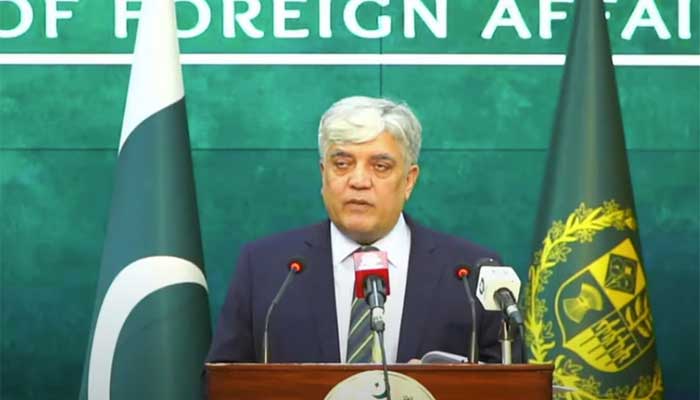
- Pakistan repelled Taliban attacks in self-defense.
- Ceasefire implemented at the request of the Taliban on October 15.
- FO rejects Afghan claim about terrorism as internal issue.
ISLAMABAD: Pakistan and Afghanistan are engaging in constructive dialogue aimed at achieving a peaceful resolution to the ongoing border tensions, the foreign ministry said on Friday.
In his weekly press briefing, FO spokesperson Shafqat Ali Khan said Pakistan had repeatedly informed Kabul about Fitna al-Khawarij’s presence in Afghanistan.
He expressed deep concern over the Taliban’s “provocative attacks” along the border between October 11 and 15, which Pakistan effectively repelled in self-defence.
The spokesperson said that Taliban forces and the terrorist hideouts under their use suffered significant losses. “Our retaliatory action was against terrorist elements, not civilians,” he said, adding that a 48-hour ceasefire was imposed starting at 6 p.m. on October 15 at the request of the Taliban.
Khan said both countries are engaging in constructive talks for a peaceful resolution. Pakistan hopes that the Taliban government will take concrete measures against terrorist elements and ensure that Afghan soil is not used for terrorism in accordance with its commitments.
He added that Pakistan has hosted more than four million Afghan refugees for four decades and will continue to regulate the presence of foreigners on its territory in accordance with international standards and national laws.
“Pakistan wishes to see a peaceful, stable and prosperous Afghanistan,” Khan said, expressing hope that one day the Afghan people will live freely under a representative and inclusive government.
The spokesperson also expressed Pakistan’s serious reservations over the recent India-Afghanistan joint statement, terming its references to Jammu and Kashmir as a clear violation of UN resolutions and international law.
He further rejected the Afghan Acting Foreign Minister’s claim that terrorism was Pakistan’s internal problem, pointing out that Pakistan had already shared details of active terrorist groups operating from Afghan territory.
“Afghanistan cannot absolve itself of the responsibility of preventing its territory from being used for terrorism,” Khan concluded. “Peace and stability are shared responsibilities.”



